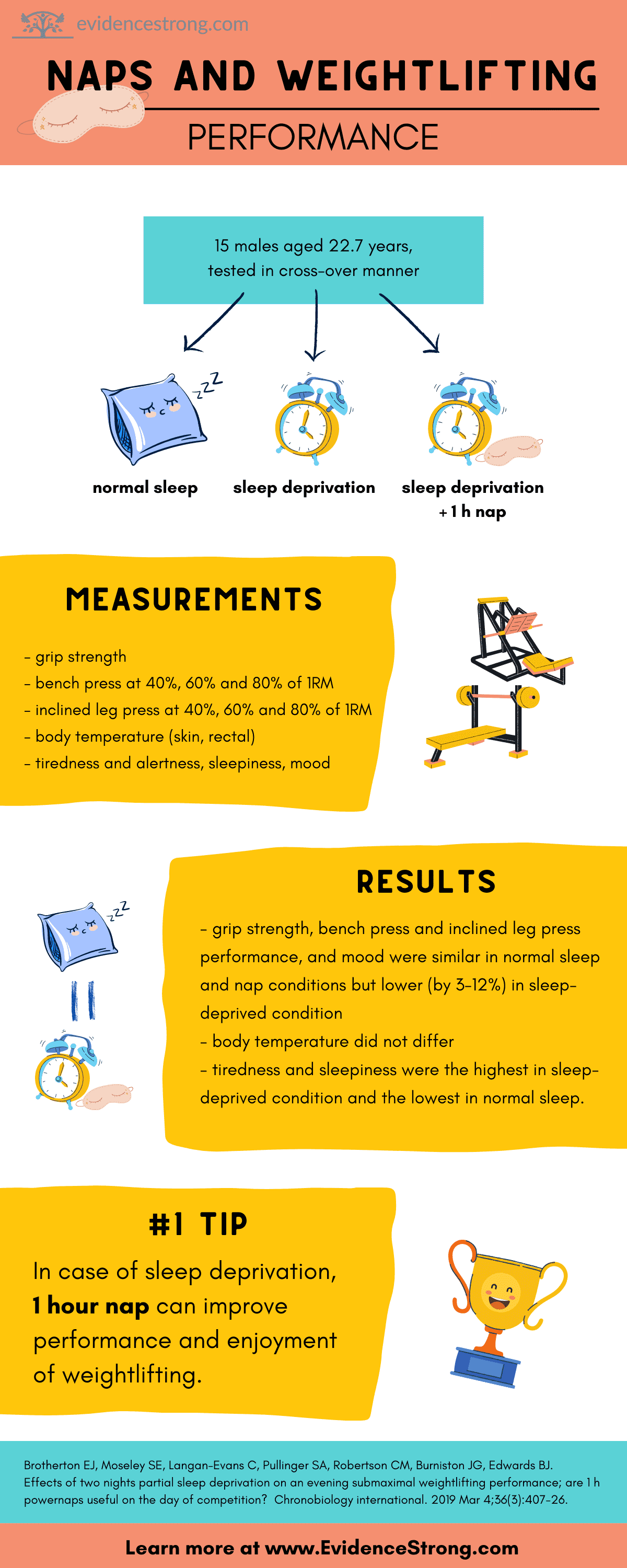Summary of a study testing the influence of a nap when sleep deprived on performance and enjoyment of weightlifting in males.
Who
15 males aged 22.7 ± 2.5 years (height: 182.4 ± 7.5 cm; weight: 89.0 ± 13.8 kg; (bench press 1RM: 98.0 ± 24.8 kg; inclined leg press 1RM; 289.3 ± 30.6 kg) (UK).
Design
Cross-over study with random order allocation.
Normal sleep
- participants went to sleep at 23:00 and got up at 6:30
- 2 nights
Sleep deprived
- participants went to sleep at 3:30 and got up at 6:30
- 2 nights
Sleep deprived with nap
- participants went to sleep at 3:30 and got up at 6:30, but had 1h nap at 13:00
- 2 nights
Outcome measures
- peak grip strength
- bench press at 40%, 60% and 80% of 1RM
- inclined leg press at 40%, 60% and 80% of 1RM
- body temperature (skin, rectal)
- tiredness and alertness, sleepiness, mood
Main results
- peak grip strength for dominant hand was higher for participants who slept normally or were sleep deprived but napped than the ones who were sleep deprived and didn’t nap (2.7% difference). No difference between normal sleeper and the ones who were sleep deprived but napped.
- Bench press’ average power (by 11.2%), average force (by 3.3%), peak velocity (by 9.4%) and RPE were negatively affected by sleep deprivation were compared with normal sleep or napping conditions. Time-to-peak velocity and distance the bar traveled were not.
- Leg press average power and RPE (rate of perceived exertion) were higher in normal sleep and with a nap compared to the sleep deprived condition. Peak velocity, time-to-peak velocity and average force were not affected by sleep.
- no difference between the sleep conditions in body temperature.
- normal sleep had the highest alertness, nap condition was second and sleep deprived condition produced the lowest alertness. The same was observed for tiredness.
- sleepiness was the lowest in normal sleep, than in the nap condition, and was the highest in sleep deprived condition.
- mood profiles were more positive in normal sleep and nap condition when compared with sleep deprivation.
Take home message
For a clinician & coach
Two nights of sleep deprivation reduced performance (between 2.7 and 11.2%) and enjoyablness of weightlifting. One hour nap brought these values back to comparable with values for normal sleep.
For a parent
In case of sleep deprivation (travel, nerves before a competition), one hour nap can improve performance and enjoyment of weightlifting.
For an athlete
In case of sleep deprivation (travel, nerves before a competition), one hour nap can improve performance and enjoyment of weightlifting.
Original article
Brotherton EJ, Moseley SE, Langan-Evans C, Pullinger SA, Robertson CM, Burniston JG, Edwards BJ. Effects of two nights partial sleep deprivation on an evening submaximal weightlifting performance; are 1 h powernaps useful on the day of competition?. Chronobiology international. 2019 Mar 4;36(3):407-26.
